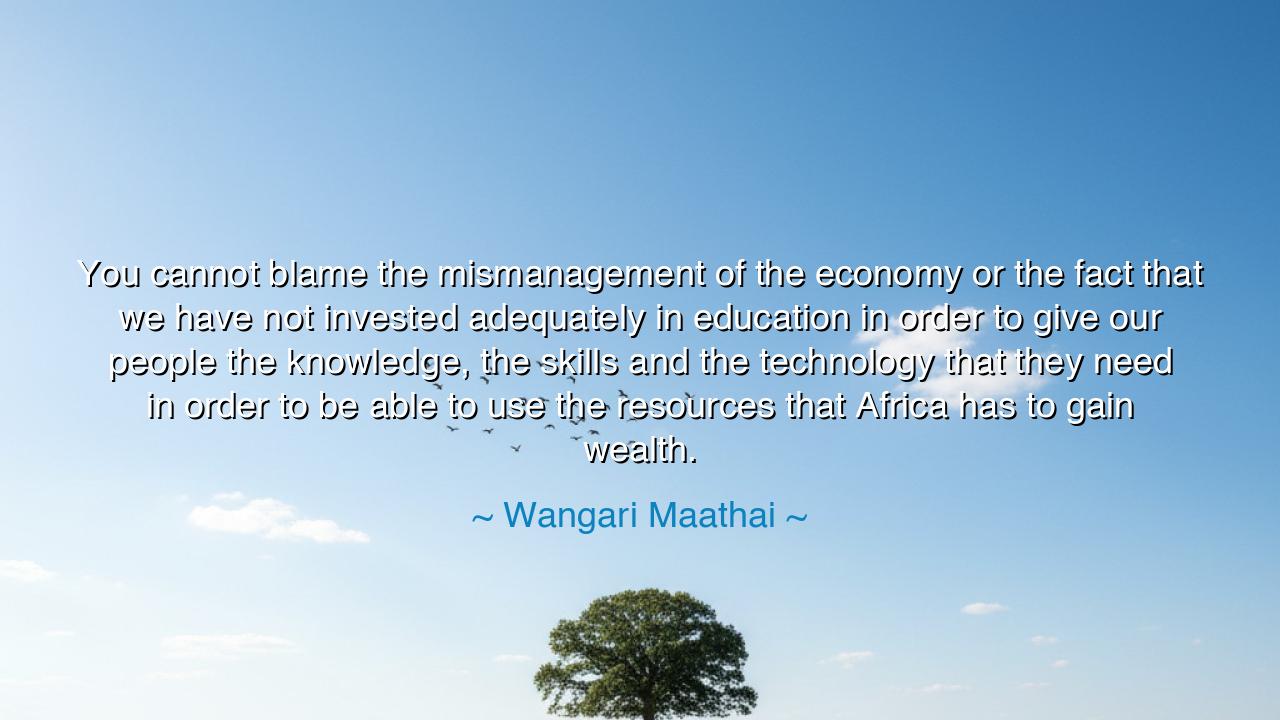
You cannot blame the mismanagement of the economy or the fact
You cannot blame the mismanagement of the economy or the fact that we have not invested adequately in education in order to give our people the knowledge, the skills and the technology that they need in order to be able to use the resources that Africa has to gain wealth.






The words of Wangari Maathai rise like a clear trumpet in the still air of our age: “You cannot blame the mismanagement of the economy or the fact that we have not invested adequately in education in order to give our people the knowledge, the skills and the technology that they need in order to be able to use the resources that Africa has to gain wealth.” This statement is not merely about Africa—it is about the human condition itself. It is a reminder that no civilization can ascend by lamenting its misfortunes. Progress, Maathai teaches, is not a gift from the heavens but a labor of the mind and spirit, forged through education, responsibility, and vision.
Wangari Maathai spoke these words from the heart of Africa, a land abundant with natural wealth—rivers that shimmer with life, mountains crowned with forests, and soils fertile with promise. Yet she saw her people chained by ignorance and dependency, not by lack of blessings but by the failure to nurture the intellect. She understood that the truest riches of a nation are not its gold or oil, but its educated citizens, those who can shape raw resources into enduring prosperity. To her, blaming “mismanagement” or “foreign exploitation” was a hollow echo. The real battle, she said, was within—the war for knowledge, discipline, and creative courage.
In this light, her message mirrors the wisdom of the ancients. When the Greeks built their academies, when the Egyptians carved hieroglyphs of science and spirit into stone, they knew that power belonged to those who understood the world. No empire endured that did not first master the art of learning. So too in Africa, Maathai envisioned a renaissance where education would not be a privilege but a weapon against poverty and despair. For without the skills and technology to command one’s own resources, even the richest soil will yield only dependency.
Consider her own life as testament. Born in the Kenyan highlands, Maathai watched forests vanish under the axe of exploitation. She did not cry to the heavens—she planted trees. Through the Green Belt Movement, she mobilized thousands of women to restore the land, one seedling at a time. Her hands were her answer to hopelessness, her education her shield against ignorance. In that quiet labor, she demonstrated that knowledge, discipline, and action could restore both land and dignity. Her cause was not charity, but empowerment.
History offers another echo in the story of Japan’s Meiji Restoration. Faced with the threat of colonization, Japan did not lament its weakness—it invested in education, imported knowledge, and taught its people the crafts of modernity. Within a single generation, it transformed from feudal obscurity to industrial power. The same path, Maathai urged, lay open before every African nation: to cultivate minds before mines, to value teachers as much as traders, and to measure wealth not in exports but in enlightenment.
The deeper meaning of her words is thus this: the greatest wealth is wisdom, and the truest poverty is ignorance. No government decree, no foreign aid, no external reform can replace the internal revolution that begins when a people decide to learn. To possess land without knowing how to use it is to be rich in chains. To master one’s environment through learning and innovation is to break those chains forever.
Let this be the lesson we carry forward: do not blame fate, leaders, or history for what you have not yet built. Begin with education—not as the memorization of facts, but as the awakening of the mind to its own power. Seek knowledge with the same hunger that men seek gold. Teach your children to think, not just to obey. Use what you have, learn what you lack, and never surrender your future to excuses. The destiny of a nation lies not in its resources, but in the resourcefulness of its people.
Thus spoke Wangari Maathai—not as a politician, but as a prophet of renewal. Her voice reminds us that the most fertile soil is the human soul, and its greatest harvest is wisdom. When the mind is cultivated, the land will prosper; when the heart is strong, the nation will rise. For the tree of progress grows not from wealth, but from knowledge, courage, and faith in one’s own strength.






AAdministratorAdministrator
Welcome, honored guests. Please leave a comment, we will respond soon